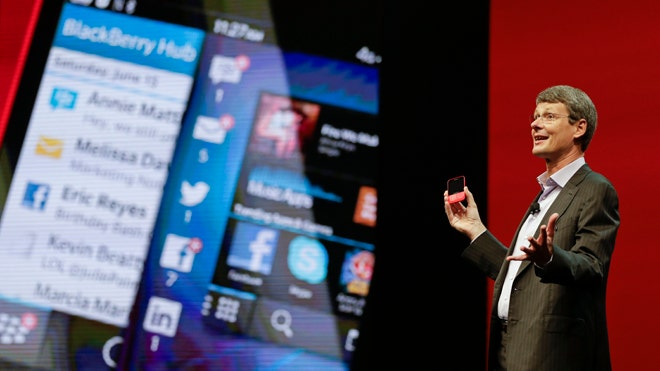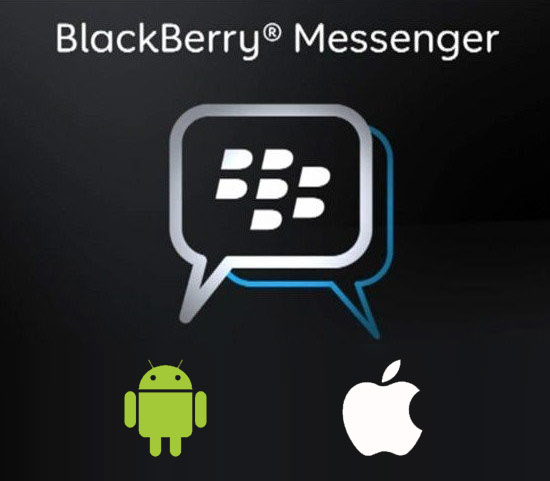TL;DR: BlackBerry should abandon the hardware business (or, at least, its high-end smartphone business) and develop its software portfolio as a multi-platform ecosystem.
At some point in early 2012, I became fairly convinced that BlackBerry, RIM (Research In Motion) at the time, would not survive 2 more years if it kept going the way it did. Years of boneheaded decisions had piled up to staggering heights, and attempts at the time to stop the bleeding didn't seem to be working at all. BlackBerry was going down, and there was nothing that was going to help their cause.
[BlackBerry CEO Thorsten Heinz presenting the new BlackBerry Q10]
Just over a week ago, reports started coming out that Windows Phone, Microsoft's latest mobile endeavor, had overtaken BlackBerry as the No. 3 Smartphone OS, with just over 3% adoption. This all but solidified the race at the bottom for #3, and Microsoft has been focused enough to zoom right past BlackBerry. When I saw this development, I had a solid moment of celebration: I am a huge Windows and (especially) Windows Phone fanatic. I was an early adopter of Windows Phone 7, having obsessed over it since it was first unveiled as the Windows Phone 7 Series, and have even worked as a Brand Ambassador to Microsoft, advertising Windows 8 and RT to the masses. Needless to say, I was excited and felt a bit proud about this. We finally got #3. But then, as I thought about it some more, I realized something: I felt genuine pity towards BlackBerry.
People point to Apple and the first iPhone as having created the smartphone industry back in 2007, but it cannot be overlooked how BlackBerry was actually the company to Validate the concept of a smart phone, a handheld computer.
Throughout the 2000's, it was RIM the one that created and dominated the 'smart phone' market, with the now iconic keyboard and other signature features such as mobile email and, in their last years of dominance, messaging and security. Their spectacular downward spiral serves as tomes of lessons for entrepreneurs and companies big and small that all orbit around a very important theme: Adapting.
Let's take a deeper look at what's happened, and what the future may hold...
Extensively detailed by The Verge (http://www.theverge.com/2012/2/21/2789676/rim-blackberry-mike-lazaridis-jim-balsillie-lost-empire), the house that Mike Lazardis built out of Waterloo, Ontario, slowly lost its footing and crumbled down in the years after the iPhone was introduced. A refusal to adapt to a rapidly changing industry cost them just like it did a number of former big players in the industry, some who recovered and some who disappeared. Nokia, for example, had an increasingly nonexistent presence in the US, while serving mostly, if not only, feature phones in the era of cheap, powerful smartphones. Nokia, like BlackBerry, faced increasing pressure, huge financial problems and a brand that, while not as worn out or tarnished as BlackBerry, simply didn't register as desirable. Like BlackBerry, Nokia was, and still is, an innovative company in every sense of the word; placing emphasis on iconic design and pushing the envelope on mobile technologies such as imaging and displays, not to mention building an excellent applications suite.
Of course, Nokia now is a full-on Windows Phone player, shipping an overwhelming majority of the OS's phones and gathering near-universal praise from the Tech Media and community. Award-winning designs, top notch features and services and a refreshing focus on customer service and feedback have all helped Nokia rehab its brand and become as beloved as it once was, even if the sales don't compare to that of Samsung's Galaxy S devices or Apple's iPhones. The main difference between Nokia and BlackBerry, aside from the paths each took after failing and falling, is that Nokia moved quickly to figure out what the issue was and weighing in the options, setting a path that would garner them the financial turn around they desperately needed without compromising their legendary reputation and brand image. They are perhaps the best example of a small brand from a past era that organically grew and transformed into a modern one. Well aware of their shortcomings, as well as their strengths, and basing their future crucial decisions on those. BlackBerry obviously did not take a similar road.
It's 2007 and Steve Jobs is on stage, introducing "A Phone, an iPod and an Internet Communications Device." The iPhone's overwhelming hype was matched only by its numerous skeptics. In his presentation, Jobs would almost literally erase BlackBerry Devices' most distinguishing feature: the Keyboard. "What we're gonna do is, we'll get rid of all these buttons, and just make a giant screen."
Just like that, BlackBerry's days were numbered. Steve Jobs nailed it, when he said that you're stuck with those buttons whether you need them or not. The buttons also meant a very permanent way of interacting with your phone, as well as a very limited array of things you could do with your phone. The touch screen phone meant a continually changing and easily updated user interface and experience that could vary from System, all the way down to individual software (or Apps, as they came to be known). The iPhone, and the plethora of phones that popped up after it, could simply do more than a Hardware Keyboard phone. Learning to type on a screen was not the barrier of entry BlackBerry and other companies thought. The way you interact with your phone was changing, just as you were changing with it; BlackBerry, however, didn't think it would be necessary to change the way they do things. They had their subscribers, and those are the people that they would retain. But that can only take you so far.
Recently, BlackBerry released the Z10 and the Q10, their first 2 devices running on their newest software, BB10. BB10 itself is a whole story of fiasco itself, which I'll choose to not detail (Delays upon delays, identity problems, etc). They are both solid devices that represent a very clear sense of present and legacy, especially in the Q10. While the Z10 is a beautiful and powerful device, it is the Q10 that is getting even more attention. Ironically, the Q10 is a hardware keyboard (QWERTY) device. Apparently, after 5 years of touchscreen madness, it's -okay- to use a keyboard again. While the Z10 hasn't had stellar sales numbers, it is the Q10 that will keep getting more attention because it is a clear survey device: "Is it possible to go back to this?" and its sales will reflect whether or not there is still a profitable market for QWERTY devices. The recently announced Q5, a cheaper version of the Q10, is targeted at emerging markets where BlackBerry has a better chance for success, in my opinion. Thorsten Heinz, BlackBerry's current CEO, seems to slowly but surely figuring out what he needs to do. He realizes that he must adapt, and diversify, to survive. He would seem to be headed in the right direction, but all it does is delay the inevitable: BlackBerry, as a handset maker, is done. If BlackBerry wants to survive as a company and as a brand, their future lies, not in the phones themselves, but what's inside of them.
For all their faults, BlackBerry does have some of the more well regarded software suites around. BBM, or BlackBerry Messenger, for example, was the first proposal for a fully integrated, seamless messaging platform that blurred the lines between instant messaging and texting. In the transition and overlap between MSN Messenger, Email and the modern social network, BBM was present right in the transition and almost single-handedly launched BlackBerry into its peak as a company. BBM was the application responsible for your WhatsApps and iMessages. The newest version of BBM is a step in the right direction: for the first time, it will be offered in iOS and Android handsets. And it is still one of the best messaging offerings around.
As far as software goes, BlackBerry can still churn out a solid product here and there. If they want to survive, they will Pivot into a software company. They will zero in on their First Party Apps and turn them into multi-platform tools that will be present in every device. Keep your emerging markets hardware presence if you must, but your future lies in what you can offer -beyond- hardware. Make BBM -the- messaging platform for secure communication, have it on all mobile and Desktop OS's. Heck, have a HTML5 Web Application version if you must, and keep costs way down. Develop the hell out of BlackBerry Enterprise Service software: In today's BYOD workplace, universality is key, and "Oh, my phone doesn't have that." is unacceptable, and BlackBerry could be the ones to lead the way. Story Maker is an interesting app, flesh that out to be a solid multimedia creation offering, to rival the best mobile editing software. Keep your best first-party services and expand them to as many devices as possible. I'll even allow the development of totally new products, as long as the vision is clear and it does not overlap any other ones.
The answer is right in front of them. BlackBerry has been taking the right steps, but they haven't realized it. Heinz has hinted at the fact that the company is thinking beyond hardware. Yes. Do that. People just do not care about BlackBerry -phones- as much as they used to. However, they do think about the -brand-. And enterprise still wants and prefers BlackBerries.
So, BlackBerry. That's your move. Pivot into software-only company. It will mean layoffs, but this in itself will help Blackberry cut humongous amounts of costs, immediately positioning it towards profit.
BlackBerry: From Smartphone Pioneer, to Near-Death, to Premier Software Developer.
Alberto
Facebook: Alberto Endavant
Twitter: @AlbertoEndavant
Youtube: Alberto Endavant
*If you have an idea for a future post, or any questions you might need help with, don't hesitate in contacting me through any of the social networks, or just send an email to alosveintipico@gmail.com *






No hay comentarios.:
Publicar un comentario